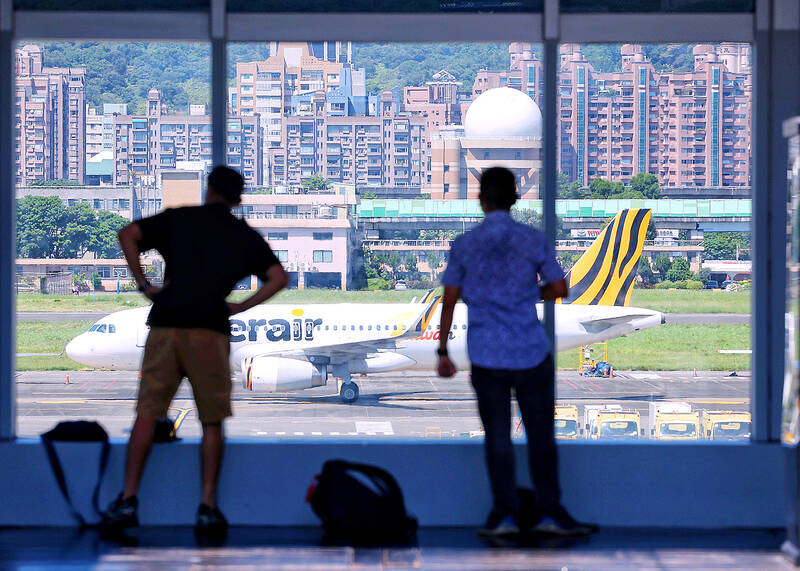The Cabinet yesterday approved a plan to next month reopen Taiwan’s borders to all visitors and lift the quarantine mandate for arrivals, provided the nation’s COVID-19 situation does not escalate.
The changes are likely to take effect on Oct. 13 as part of a phased easing of border controls that is to start on Thursday next week when a negative polymerase chain reaction test result would no longer be needed, Cabinet spokesman Lo Ping-cheng (羅秉成) told a news conference.
Arriving travelers would instead be given four rapid antigen home test kits, Lo said.

Photo: CNA
The three-day quarantine requirement followed by four days of mandatory self-health monitoring would be in effect until Oct. 13, he said.
However, the rule would on Thursday next week be relaxed slightly, with arrivals being allowed to quarantine in a residence occupied by others as long as they have a room of their own with a bathroom attached, Lo said.
If the COVID-19 situation does not worsen, mandatory quarantines would be scrapped on Oct. 13, and travelers would instead be asked to monitor their health for seven days after arrival, he said.
The weekly cap on arrivals would be raised to 150,000, Lo said, adding that this would include tour groups.
Tourists from countries with which Taiwan has no mutual visa-waiver program would no longer be excluded, he added.
Deputy Minister of Health and Welfare Victor Wang (王必勝), who heads the Central Epidemic Command Center, said if the number of daily COVID-19 cases starts rising again, the quarantine requirement might be retained.
In a radio interview earlier yesterday, Wang said the mask mandate might gradually be lifted for outdoor spaces and select indoor spaces, but would remain in potentially crowded places such as on public transportation.
Travel Quality Assurance Association spokesman Ringo Lee (李奇嶽) said the tourism industry welcomes the announcements, but the government should implement measures to ensure a smooth transition to the new policy.
“The government should raise the weekly cap on arrivals, allow airlines to raise the number of international flights to Taiwan and lift the ban for travel agencies to organize package tours. These supporting measures would give travel agencies more flexibility when they arrange inbound or outbound tours,” Lee said.
The government should also step up tourism marketing targeting foreign travelers, he added.
Taiwan should offer travel insurance similar to that offered in Japan, covering tourists’ expenses should they contract COVID-19 during inbound or outbound trips, Lee said.
Phoenix Tours general manager Benjamin Pien (卞傑民) said the inbound and outbound tour markets would probably recover to 50 to 60 percent of pre-pandemic levels in the fourth quarter of this year.
It would take another six months to a year for the markets to fully recover, he added.
Additional reporting by Shelley Shan

CHAOS: Iranians took to the streets playing celebratory music after reports of Khamenei’s death on Saturday, while mourners also gathered in Tehran yesterday Iranian Supreme Leader Ayatollah Ali Khamenei was killed in a major attack on Iran launched by Israel and the US, throwing the future of the Islamic republic into doubt and raising the risk of regional instability. Iranian state television and the state-run IRNA news agency announced the 86-year-old’s death early yesterday. US President Donald Trump said it gave Iranians their “greatest chance” to “take back” their country. The announcements came after a joint US and Israeli aerial bombardment that targeted Iranian military and governmental sites. Trump said the “heavy and pinpoint bombing” would continue through the week or as long

TRUST: The KMT said it respected the US’ timing and considerations, and hoped it would continue to honor its commitments to helping Taiwan bolster its defenses and deterrence US President Donald Trump is delaying a multibillion-dollar arms sale to Taiwan to ensure his visit to Beijing is successful, a New York Times report said. The weapons sales package has stalled in the US Department of State, the report said, citing US officials it did not identify. The White House has told agencies not to push forward ahead of Trump’s meeting with Chinese President Xi Jinping (習近平), it said. The two last month held a phone call to discuss trade and geopolitical flashpoints ahead of the summit. Xi raised the Taiwan issue and urged the US to handle arms sales to

State-run CPC Corp, Taiwan (CPC, 台灣中油) yesterday said that it had confirmed on Saturday night with its liquefied natural gas (LNG) and crude oil suppliers that shipments are proceeding as scheduled and that domestic supplies remain unaffected. The CPC yesterday announced the gasoline and diesel prices will rise by NT$0.2 and NT$0.4 per liter, respectively, starting Monday, citing Middle East tensions and blizzards in the eastern United States. CPC also iterated it has been reducing the proportion of crude oil imports from the Middle East and diversifying its supply sources in the past few years in response to geopolitical risks, expanding

Pro-democracy media tycoon Jimmy Lai’s (黎智英) fraud conviction and prison sentence were yesterday overturned by a Hong Kong court, in a surprise legal decision that comes soon after Lai was jailed for 20 years on a separate national security charge. Judges Jeremy Poon (潘兆初), Anthea Pang (彭寶琴) and Derek Pang (彭偉昌) said in the judgement that they allowed the appeal from Lai, and another defendant in the case, to proceed, as a lower court judge had “erred.” “The Court of Appeal gave them leave to appeal against their conviction, allowed their appeals, quashed the convictions and set aside the sentences,” the judges